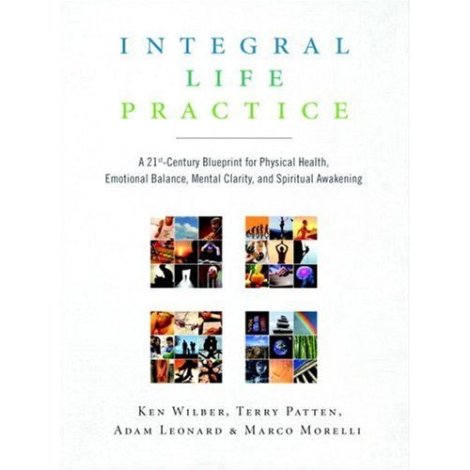Chris is a smart dude, so pay attention to what he says here. It's good (to me, at least) to have some smart people outside the integral "inner circle" commenting on the work in meaningful ways.
Read the whole review.Discussion of Integral Life Practice
Integral Life Practice. (Integral Books: 2008)
In the spirit of self-disclosure, Marco Morelli (one of the co-authors) is a close, long-time friend of mine. He sent me a copy of the book in order to review it.
–
“The meaning of a statement is the means of its enactment.” –Ken Wilber, Integral Spirituality p.258
The question I think that has really haunted integral thought to date is how do we do integral? How do we recognize when something is actually more integrated (my preferred term increasingly to integral as such)? How does integral become the enactment of an actually different lifeworld? How does it become an existential reality, a drive, even calling for individuals?
In academic disciplines, integral thought first clears away the clutter within a field. It opens up the vantage points and worthwhile findings of any sub-groupings already within a discipline. And finds a way to order them rightly with one another. Integral theory in other words is itself a practice.
The second phase of integral I would argue is the beginning of the creation of integral norms, standards, and best practices within a field. From Holocracy, to Gail Hochachka’s Integral Development work, to Daniel O’Connor’s Mutual Praxis of Transparency, Choice, & Accountability, to Mark Edwards’ Integral Cycle of Learning–these are just a sampling of the various forays into the second phase. [For those wondering, I consider learning the integral map and language phase 0 or perhaps 0.5].
The Holy Grails of Phase 1 and 2 would be the ability of now more integrated disciplines–with their own houses in order–being able to truly and really inter-act with one another. True multi-disciplinarity, even trans-disciplinarity. Both at the level of discourse and at the level of practice. As a personal example, in my own work towards an Integral Christianity, I feel myself more and more pushed to be studying Integral Economics. Integral Economis somehow I sense has something to teach me about Integral Christianity.
And now Integral Life Practice joins this growing field of 2nd-phase integration. It seeks to help create a common language and practice structure across various spiritual lineages, so they can finally and truly dialogue. What Br. David Stendl-Rast calls in his blurb for the book a GPS (Global Practicing System). Following Wilber’s own maxim, therefore, the meaning of an [More] Integral Life Practice is the means of its enactment. More on that in a sec.

No comments:
Post a Comment